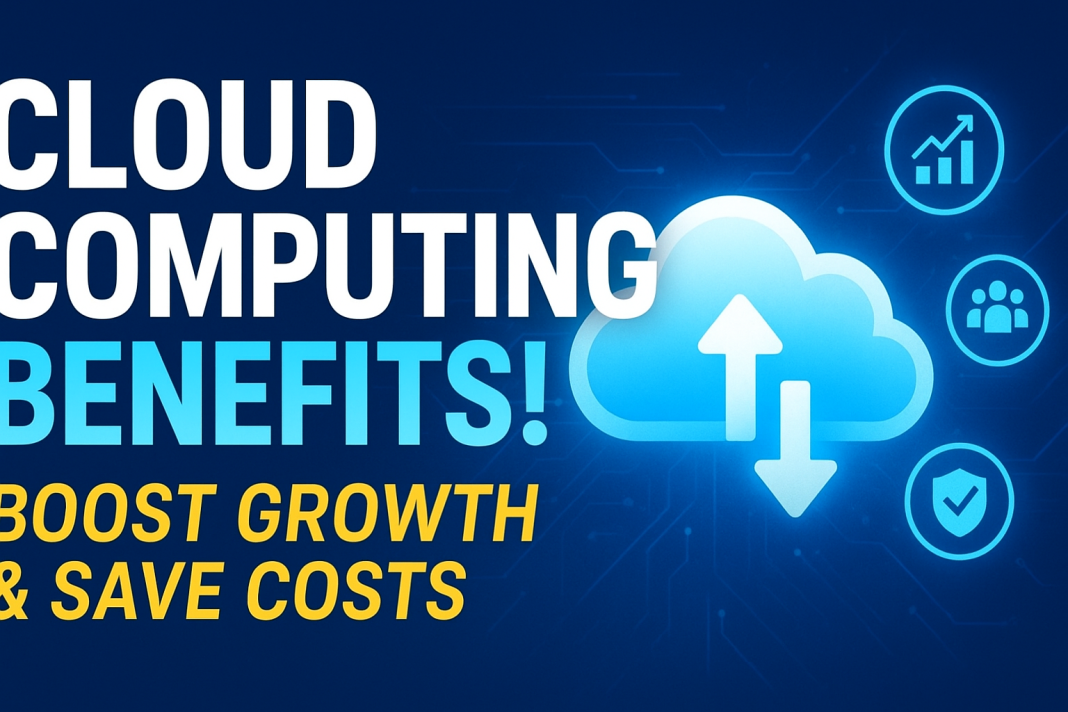Introduction
In today’s fast-paced digital world, businesses need agility, scalability, and cost-efficiency more than ever. Cloud computing offers all this and more, enabling companies to store, access, and manage data over the internet rather than relying on traditional on-premise servers. Whether you’re a startup or a multinational corporation, cloud technology is transforming how businesses operate.
What is Cloud Computing?
Cloud computing is the delivery of computing services—servers, storage, databases, networking, software, and analytics—over the internet (“the cloud”). Instead of maintaining physical infrastructure, businesses can access resources on-demand, paying only for what they use.
Types of Cloud Computing
- Public Cloud – Services offered by third-party providers like AWS, Google Cloud, or Microsoft Azure.
- Private Cloud – Exclusive cloud environment for a single organization.
- Hybrid Cloud – A combination of public and private clouds for flexibility.
Key Benefits of Cloud Computing for Businesses
1. Cost Efficiency
- Eliminates the need for expensive on-site hardware.
- Reduces IT maintenance and energy costs.
- Pay-as-you-go models help businesses manage budgets effectively.
2. Scalability and Flexibility
Cloud computing allows businesses to scale resources up or down based on demand. This ensures operations remain smooth during peak periods without overinvesting in infrastructure.
3. Enhanced Collaboration
Teams can access files and applications from anywhere, fostering real-time collaboration. Tools like Google Workspace or Microsoft 365 make remote work seamless and efficient.
4. Data Security and Backup
Leading cloud providers implement advanced security protocols, including encryption and multi-factor authentication. Automatic backups reduce the risk of data loss.
5. Business Continuity
Cloud services offer disaster recovery solutions that ensure your business stays operational even during unexpected outages or emergencies.
6. Faster Innovation
Cloud platforms provide access to advanced technologies like AI, machine learning, and big data analytics without heavy upfront investment. Businesses can innovate faster and stay competitive.
7. Environmental Benefits
By using shared infrastructure, cloud computing reduces energy consumption and carbon footprint, supporting sustainability initiatives.
Real-World Examples
- Netflix relies on AWS cloud services to stream content globally and handle massive data volumes efficiently.
- Airbnb uses cloud infrastructure for scalable booking management and customer data processing.
- Spotify leverages cloud computing for music streaming and personalized recommendations.
Challenges to Consider
While cloud computing offers many advantages, businesses should be aware of potential challenges:
- Data privacy concerns – Sensitive information must comply with regulations.
- Downtime risks – Dependence on internet connectivity can cause interruptions.
- Vendor lock-in – Switching providers may require effort and cost.
The Future of Cloud Computing
The future is increasingly hybrid and multi-cloud. Businesses will leverage edge computing, AI integration, and serverless architectures to optimize performance, security, and efficiency. Cloud technology is no longer optional—it’s essential for long-term growth.
Conclusion
Cloud computing empowers businesses with cost savings, scalability, security, and innovation. By embracing the cloud, organizations can stay agile, improve collaboration, and focus on strategic growth rather than IT infrastructure.
Businesses that invest in cloud solutions today will be better equipped to handle tomorrow’s challenges and opportunities.
Related Reading
- What Are Machine Customers? The $30 Trillion Shift Every CEO Must Know.
- Why AI-resistant careers are on the rise: What to learn now for long-term success.
- The Role of Blockchain in Secure Transactions
FAQs
1. What is the main advantage of cloud computing for businesses?
It provides scalable, cost-effective, and flexible access to computing resources without heavy infrastructure investment.
2. Which industries benefit most from cloud computing?
Almost every sector—technology, finance, healthcare, retail, and entertainment—leverages cloud solutions.
3. How secure is cloud computing?
Leading providers implement advanced security measures, but businesses must also follow best practices for data protection.
4. What is the difference between public and private clouds?
Public clouds are shared environments hosted by third parties, while private clouds are dedicated to a single organization.
5. Can small businesses afford cloud computing?
Yes, pay-as-you-go models make cloud services accessible and affordable for businesses of all sizes.




